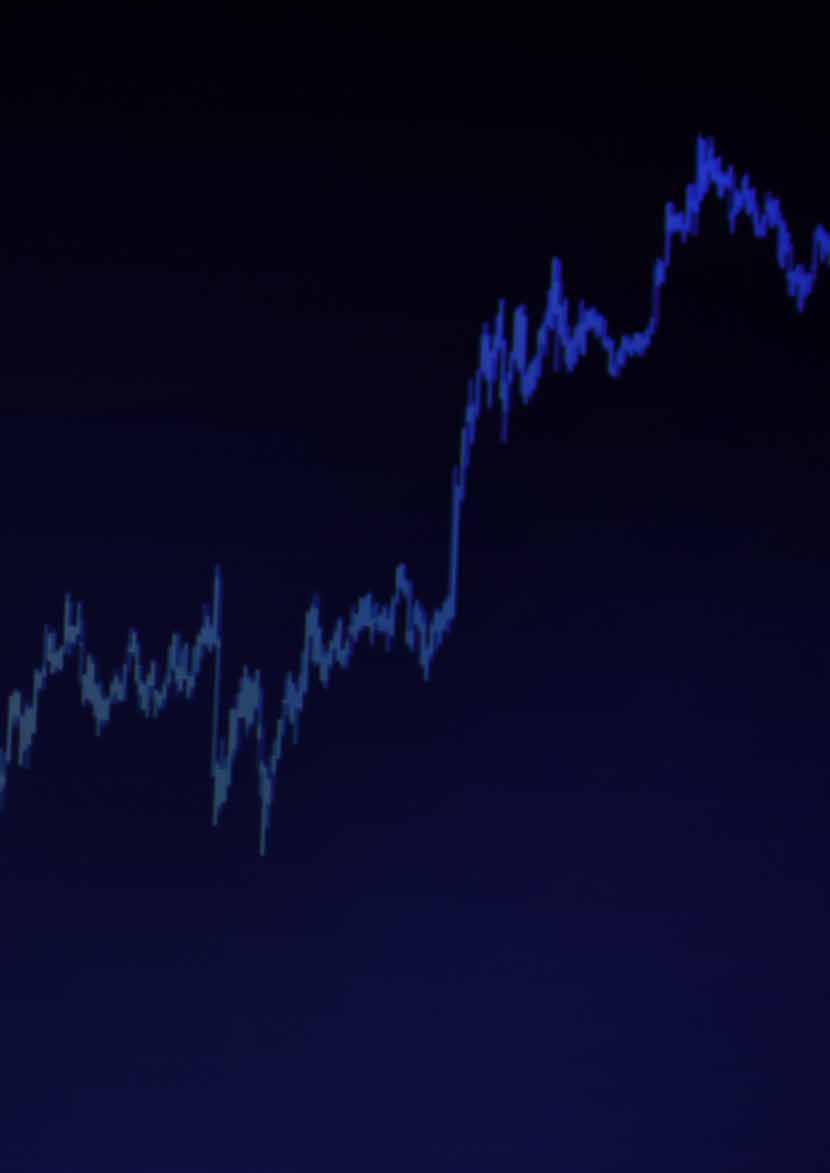
14 minute read
Investment
How COVID-19 upended investments in 2020
COVID-19 has brought unprecedented challenges to the global economy and caused many disruptions in our daily lives. But every cloud has a silver lining and quite a few industry participants have shared with Asian Private Banker throughout 2020 that the pandemic has accelerated a number of trends and has removed obstacles to change. Here are three positive changes triggered by the pandemic in 2020.
Advertisement
Investments were surprisingly resilient to a year like no other. Unprecedented monetary easing measures by central banks worldwide ensured the spectre of a recession was staved off, at least for the time being.
Rocky start
On 31 December 2019, the World Health Organization’s Country Office in China first picked up a statement by the Wuhan Municipal Health Commission on cases of ‘viral pneumonia’ in Wuhan, China. Due to the mass internal migration during the Chinese New Year and Wuhan’s geographic location as an important transportation hub in China, the virus started travelling to other provinces in the country since early January 2020. As the virus spread through China, wealth and relationship managers and investment managers suspended travel to China, a key source of offshore wealth in the region. When the China A-share market reopened on February 3, the Shanghai Securities Composite Index declined by nearly 8%. As the virus started appearing outside China, global equity and bond markets reacted sharply.
Lockin’ on private banking’s door
Countries started imposing lockdowns, and restricting travel. Meetings were severely curtailed. This hurt the ability of relationship managers to meet private banking clients in a largely relationship-driven industry. Nearly all private banks told Asian Private Banker that they had to resort to meeting clients and disseminating investment and portfolio advice online and via virtual meeting sessions. 98% of fund managers surveyed by the Investment Management Association of Singapore (IMAS) suspended all employee business travel to China with nearly three-fourths cancelling or deferring their events. At the time, the impact of the virus was not fully assessed as the investment community in the region expected it to be widely limited to China. Banks in the region shouldn’t be severely affected if the coronavirus situation can be contained into a “one to two month event”, Credit Suisse said in February. “We can look at the [2008] global financial crisis as a template on how this plays out. Banks in most places in Asia will be providing support to troubled borrowers,” said Dan Fineman, Credit Suisse’s co-head of
equity strategy, Asia Pacific and head of Thailand research said. “You won’t necessarily see pressure in banks’ balance sheets, as central banks will provide support, focusing intensively to keep SMEs alive. If this can be kept into a one to two months issue, it shouldn’t be too
much of an impact for banks.” But things were going to get worse before they got better.
“COVID-19 had a negative and limited impact on the stock markets of China and other Asian countries in the early stage of the epidemic,” said researchers writing in the Economic and Political Studies (EPS), a peer-reviewed journal hosted by Renmin University of China. Volatility went up in global markets, adding pressure on investments made by borrowing against stocks.
In Singapore, DBS evacuated an entire floor in February after one
member of staff was confirmed to be infected with COVID-19.
The silver lining
Private banking’s adoption of digital technologies went significantly up as relationship managers struggled to keep in touch with HNW and UHNW clients.
Julian Schillinger, co-founder & co-CEO, Privé Technologies, believed that the pandemic sped up the adoption of digital
technologies by three years. “When we spoke to financial institutions (such as insurance companies and banks) a couple of years ago, getting digital was absolutely on their agenda and was already a priority,” he said. But pointing to the change in funding for many financial institutions, he added: “But now, there is much more pressure on that.”
The adoption of digital tools, actually ended up increasing the intensity and frequency of client interactions as hard-to-pin down UNHWIs were more accessible due to the lockdowns.
“COVID-19 has been fantastically transformational and an accelerant in that space. We have been doing things in the last six months that we didn’t think were possible before,” Philipp Rickenbacher, CEO, Julius Baer told Asian Private Banker.
“We might hope to travel again and have face-to-face meetings once things ‘normalise’ in future, but the pandemic has made it imperative that we look at new ways to engage with clients, chiefly through the enlightened use of technology,” Kevin Herbert, managing director and co-head for North Asia at HSBC Private Banking told Asian Private Banker.
That addressed an acute need felt by private banking clients.
According to an April 2020 global survey of consumers by Kameleoon, 57% of respondents said they were disappointed by wealth management firms’ online response and lack of personalisation. Meanwhile, 67% of respondents said their current online experience will affect future purchases and 37% said they were spending more time online since the COVID-19 crisis.
COVID-19 has been accelerating disruptive forces that were already well at work within Asia’s wealth management industry, according to McKinsey & Company.

Managing investments
“During corrections in the equity markets, we requested clients to go back to their investment objectives and take a fresh look at their risk profiles,” Aman Rajoria, head private banking India at Standard Chartered Bank told Asian Private Banker.
In India, from the start of the year where 45% of client assets were in equity, 50% in fixed income, and about 5% in alternatives, allocations to stocks have come down to 30%, fixed income up to 55%, and that of alternatives & cash became 15%, Rajoria said.
That was a trend that was witnessed globally, as investors moved into fixed-income and structured products while tapping into alternatives.
Fidelity’s private banking business flourished with China high yield topped US$1.1billion in AUM due to consistent inflows from Asian private banking clients.
A “key product” that Fidelity distributed over the past year through private banks has been the Enhanced Reserve Fund as it focused on “liquidity, stability, and yield”, Johann Santer, Fidelity International’s head of private banking business, Asia ex-Japan told Asian Private Banker.
“It’s fair to say that our strategy hasn’t changed and the Asian Private Banking team aims to be a strong strategic partner to our clients in the region — regardless of the market environment,” Santer told Asian Private Banker.
“While the impact of the virus outbreak and the volatility in markets certainly keep us busy in our daily contact with clients through various remote channels, some of the key objectives of clients haven’t changed,” Santer added.
Meanwhile, real assets performed better and are expected to continue to do so as the fallout of COVID-19 becomes more evident.
Marie Owens Thomsen, global chief economist and head of intelligence research at Indosuez WM expected real assets to perform better than more liquid assets.
In China, the local regulatory push to rein in sales of singlecounterparty credit products sped up.
Though that hurt fourth-quarter revenue at Noah Wealth Management, CFO Grant Pan told Asian Private Banker that the company managed to distribute RMB 26.4 billion of standardised products for 2019, an increase of 93.9% YoY. The transaction value of standardised products in the fourth quarter reached RMB 10 billion, representing a significant increase of 580.8% YoY and 30.4% QoQ.
The transaction value of mutual funds increased by RMB 16.4 billion, setting a new distribution record for a single year and a single quarter said Pan.
The holding up of onshore bonds markets in China in terms of liquidity versus global peers came in handy.
“China’s onshore bond market remained quite liquid through the period with only a modest widening in bid/ask spreads for on-the-run bonds although trade sizes were smaller,” according to Michele Barlow, head of strategy & research for APAC and Senior Investment Strategist Yichan Shu at State Street Global Advisors.
The way ahead
Though China and the rest of the world looks as if it has come out ahead, risks still loom.
“We expect the PMI […] to be below the level of 50 in the next few readings, as more export manufacturers in the country face cancellation in orders and delays in payments,” said Anthony Chan, chief Asia investment strategist at UBP. China has been ahead of the crisis curve; now it is balancing between stringent infection containment measures and production resumption, he added.
With the COVID-19 vaccine rollout experiencing bottlenecks, the short-term outlook is “troubled” John Woods, chief investment officer, Asia Pacific, Credit Suisse told Asian Private Banker.
“Both global GDP and global industrial production will likely begin a “true” post-pandemic recovery from levels far below their respective long-term trends, Woods said. He expects a “forceful” economic rebound after February with industrial production growing faster than its long-term average for several years, albeit with ongoing short periods of substantial volatility.
Wang Jingbo: New Decade, Same Mission — Client-Centric & Striver-First
Noah Holdings Limited went public on NYSE on November 10, 2010, a date that holds a special meaning: 1 company, of 1 group of like-minded I am feel grateful for our clients’ trust and support along the way. At the beginning of the new decade, Noah will continue to respect the market, respect common sense, being Customer-driven and keep striving hard and put strivers first. Embrace the transformation to “net worth” and “portfolio” products A new decade has begun, and we aim for creating long-term value for our clients by embracing the new era of a volatile market that gears towards net-worth products. This is also a new start point for the wealth and asset management industry in China. Regarding the future, Noah is full of confidence to forge ahead. The wealth management industry in China has been undergoing a revolution accelerated by the COVID-19 pandemic. Evolving around cash pooling and rigid payment, bank financing was in the center of this revolution from 2012 to 2019, while “net worth” and “portfolio” products has quickly become the mainstream in 2020, endorsed by the new asset management rules and promoted by the pandemic, following the “deleveraging” in 2018 and the rectification of the wealth management market in 2019. New demands of our clients have surpassed industry expectations. Following the times, Noah has completed a “paradigm shift” where we got rid of our original path of non-standard fixed-income assets and
people, builds up their dream from 0 to 1. To celebrate the 10th anniversary of Noah’s listing on NYSE, Wang Jingbo, founder, chairman and CEO of Noah expressed her sincere gratitude to the company’s clients and shared her insights of the company’s past and future.
The following is an abridged version of Ms. Wang Jingbo’s speech:

Ten years ago, Noah Holdings Limited went public on NYSE. When I first started my business, I said to be there for generations of our clients, and that my whole life will be devoted to wealth management. I still feel the same today as I did 10 years ago, but today means more of a
choice than a celebration for me. our driving forces have transformed from non-standard fixed-income products to standardized funds, from product to integrated services, from product sales to investment consultancy, from sales scale to investment capacity with active management. Noah’s non-standard fixed-income products are being actively paid before their maturity date until we have none left in stock. As of Q2 2020, their proportion in funds raised has been completely replaced by standardized products.
Promote changes in client’s perceptions Investors dislikes volatility by nature, while managers try their best to make investors happy. Madoff once said, “I felt compelled to meet their expectations at any cost, so I began paying old clients' earnings and principal with new clients' money.”
Client’s needs are leading business directions, but we need to think about how to satisfy their needs in the right way. The true foundation for industry revolution is more “education for investors”, to change client’s previous perceptions, and to make our clients and peers truly understand the essence of this industry and how it creates value.
The robust growth of the industry relies on regulations and selfdiscipline. Only when you are able to create real long-term value for your clients can you bring about continuous positive incentives. The question is: how should wealth and asset management practitioners do this? How can we better inform our clients that different from saving,
investment comes with risks, and that no rigid payment is not equal to irresponsibility…
To stick to client’s needs and goals and help them solve problems requires sincere collaboration between wealth and asset managers, long-term vision of regulators and perception change of investors. All three of them are indispensable and have to be upheld in the long run.
Pursue truth and wisdom as moral responsibility The wealth and asset management industry has three features: firstly, users of products in almost every other industry can tell the product/service quality based on their user experience, while most clients in our industry can’t immediately do so. In fact, not just the clients, even regulators and practitioners in this industry aren’t able to do so.

Secondly, client’s interest isn’t fully reflected in the pricing structure of products/services in our industry. Fund managers receive disproportionately high pay that doesn’t necessarily match their contribution to client’s wealth. With very limited service provided for the clients, fund managers still charge management fee regardless of the outcome of the service.
Thirdly, the market is chaotic with confusing standards and specious theories, coming from a mixed group of industry practitioners – among them there are many “financial planners”, who don’t really understand products as their job mainly focuses on non-standard fixed-income products.
As a result, wealth and asset industry practitioners should receive stringent supervision, take the pursuit of truth and wisdom as our moral responsibility, and consciously avoid any ignorant theory. Moreover, we should truly understand our responsibility to the clients and take care of the asset entrusted to us as if every penny comes from the hard work of our own parents.
Ride with the tides of digital transformation At this new beginning, Noah will continue to learn from the best and try to answer the following questions at the core of Noah’s own revolution: how to elevate individual leadership to organizational leadership, how to understand client’s needs appropriately, how to evaluate the service ability of financial professionals, and how to identify financial products accurately by digitalization.
The wealth management industry has been around for over 200 years, and the operation pattern of organizations in the industry had remained the same for a very long time. However, in the last 20 years, especially recently, traditional business patterns have started to break down. With the development of the Internet and technology, digitalization has become the new essential for wealth management organizations in an era of more transparent information. The disruptive changes in our industry in the past 20 years originate from the rapid development and the rise of younger clients. Compared with Internet companies, wealth management companies have an incomparable edge of owning sizable and quality teams of professionals. Utilizing digitalization and standardized service process can bring about breakthroughs in capacity ceiling. Therefore, the key to success is to empower our professionals with digitalized practice standards throughout the entire service process. Moving on, any wealth management organization without competitive digital capacity will fail to deliver for clients in a timely manner.
It won’t be easy to fully digitalize the way Noah has operated in over the past 15 years, yet we have the courage and more so the responsibility to engage everyone in our organization to play a part. We have already invited some Internet professionals to our team and will continue to discover and promote more aspiring talents to let them shine on bigger stage. “Noah intelligence” is in the making as our business will benefit more from technology.
Turn green train into bullet train We will continue to build deeper trust with our clients. For over eight months, we have been interacting with and listening to our clients and industry peers, learning from best practices both internally and externally, and we are ready to make it happen at the beginning of a new decade, knowing what and how we can achieve with revolutionary visions and solutions.
Noah will continue to center around our clients, with our promises to keep up the good throughout this process. I believe that Noah will be the wealth management organization chosen by Chinese people around the world, and draw global attractions.
Address:
Enquiry no.: WeChat ID: Facebook: Building 2, Changyang Valley, 1687 Changyang Road, Yangpu District, Shanghai, China 200090 400-820-0025 NoahGroup Noah Holdings Limited










